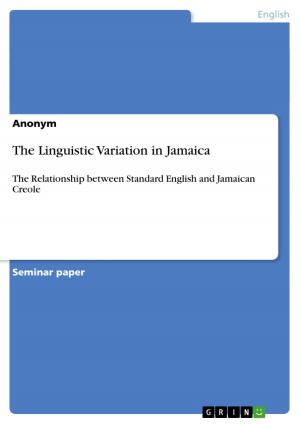Pragmatic deficits in the language of individuals with Asperger Syndrome or High-functioning Autism
Nonfiction, Reference & Language, Study Aids, ESL, Foreign Languages| Author: | Caroline Lorig | ISBN: | 9783640881024 |
| Publisher: | GRIN Publishing | Publication: | March 31, 2011 |
| Imprint: | GRIN Publishing | Language: | English |
| Author: | Caroline Lorig |
| ISBN: | 9783640881024 |
| Publisher: | GRIN Publishing |
| Publication: | March 31, 2011 |
| Imprint: | GRIN Publishing |
| Language: | English |
Seminar paper from the year 2010 in the subject English - Pedagogy, Didactics, Literature Studies, grade: 1,7, University of Cologne, language: English, abstract: 'Not everything that steps out of line, and thus 'abnormal', must necessarily be 'inferior'' Hans Asperger (1938) Luisa is fifteen years old and a very pretty young girl. In school life, she takes the role of the friendly, shy and overly calm girl who especially flourishes when reciting verses by heart or when singing songs. In other situations, she stays very calm and sometimes even seems to be withdrawn from what is happening around her. If you spend more time together with her, you will notice how much she tries to be integrated in the social life around her, but also how she does not know how to go about it. When you talk to her, she rarely looks at her conversation partner and she often seems to answer inadequately to specific questions. Nevertheless, her vocabulary is very felicitous, although sometimes you feel like she actually does not want to listen to what you yourself have to tell. Luisa is diagnosed with high-functioning autism. A lack of social understanding, a limited ability in conducting a reciprocal conversation and a repetitive repertoire of interests are the main symptoms of high-functioning autism. I work with Luisa and many times, I had to experience a hindered communication due to her problems of understanding the meaning of what other people say, or how to use speech appropriately herself. This is why I chose this topic. The first part of this paper deals with the attempt to find a definition for Autism, Asperger Syndrome and High-functioning Autism. A general overview of the typical symptoms, diagnosis criteria and especially the difficulties in the prag-matic aspects of language shall be given. In the second part, the theoretical framework of this paper shall be explained. Relevance Theory and the Theory of Mind will be explained in more detail as they both might be able to explain at least some features of the language of individuals with Asperger syndrome and high-functioning autism. The main part of this paper, however, is concerned with the pragmatic deficits in the language of people with Asperger syndrome and high-functioning autism, exemplified and explained in more detail by means of several sample utterances.
Seminar paper from the year 2010 in the subject English - Pedagogy, Didactics, Literature Studies, grade: 1,7, University of Cologne, language: English, abstract: 'Not everything that steps out of line, and thus 'abnormal', must necessarily be 'inferior'' Hans Asperger (1938) Luisa is fifteen years old and a very pretty young girl. In school life, she takes the role of the friendly, shy and overly calm girl who especially flourishes when reciting verses by heart or when singing songs. In other situations, she stays very calm and sometimes even seems to be withdrawn from what is happening around her. If you spend more time together with her, you will notice how much she tries to be integrated in the social life around her, but also how she does not know how to go about it. When you talk to her, she rarely looks at her conversation partner and she often seems to answer inadequately to specific questions. Nevertheless, her vocabulary is very felicitous, although sometimes you feel like she actually does not want to listen to what you yourself have to tell. Luisa is diagnosed with high-functioning autism. A lack of social understanding, a limited ability in conducting a reciprocal conversation and a repetitive repertoire of interests are the main symptoms of high-functioning autism. I work with Luisa and many times, I had to experience a hindered communication due to her problems of understanding the meaning of what other people say, or how to use speech appropriately herself. This is why I chose this topic. The first part of this paper deals with the attempt to find a definition for Autism, Asperger Syndrome and High-functioning Autism. A general overview of the typical symptoms, diagnosis criteria and especially the difficulties in the prag-matic aspects of language shall be given. In the second part, the theoretical framework of this paper shall be explained. Relevance Theory and the Theory of Mind will be explained in more detail as they both might be able to explain at least some features of the language of individuals with Asperger syndrome and high-functioning autism. The main part of this paper, however, is concerned with the pragmatic deficits in the language of people with Asperger syndrome and high-functioning autism, exemplified and explained in more detail by means of several sample utterances.















